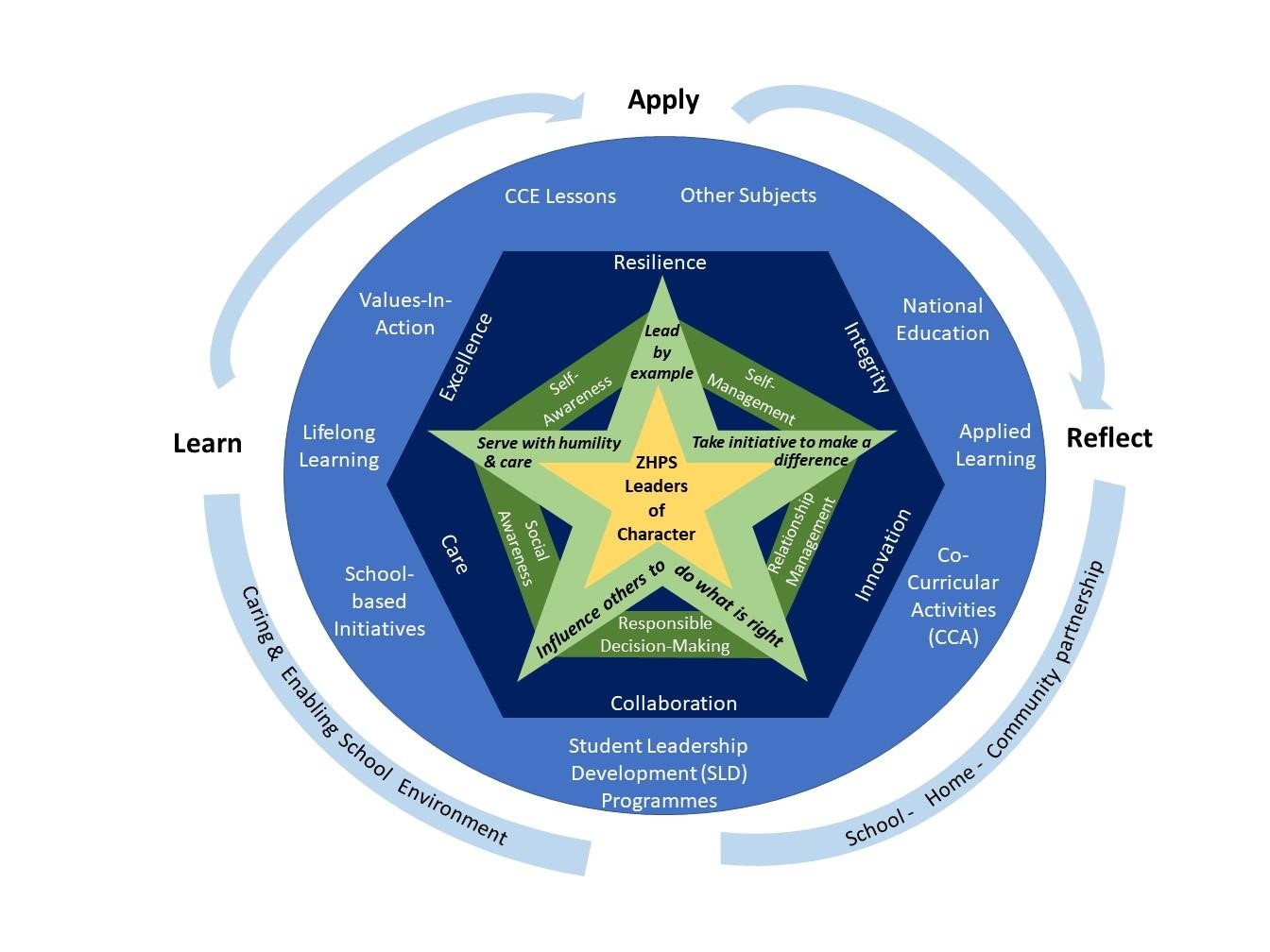CCE Framework
CCE Framework

In ZHPS, Character and Citizenship Education (CCE) aims to develop our students to become leaders of character and active citizens who contribute positively.
As leaders of character, students are expected to:
- lead by example – being a good role model and earning the trust and respect of others
- serve with humility and care – taking good care of others and putting others before self
- take initiative to make a difference – going the extra mile and creating positive changes
- influence others to do what is right – promoting positive thoughts, attitude and behaviour
To lead themselves and others effectively, they should possess social-emotional competencies, namely self-awareness, self-management, social awareness, relationship management and responsible decision making. They are anchored in values and consistently live out the school values (RI2C2E):
| Resilience | When we face challenges, • we persevere. • we think positive thoughts / we are brave and optimistic. • we seek help and support from others. • we are adaptable and resourceful. |
| Innovation | • We come up with new ideas or methods. • We make changes to an existing product or idea to better improve it. |
| Integrity | • We are honest. • We are trustworthy. • We stand up for what is right. • We are sincere and consistent in our thoughts, words and actions. |
| Care | • We care for ourselves and our belongings. • We care for and respect others – we treat others the way we want to be treated. • We care for our school and community. |
| Collaboration | • We participate actively in group activities. • We practise good communication skills. • We organise ourselves well to achieve our shared goals. • We are open to different points of view. • We achieve our shared goals by tapping on one another’s strengths. |
| Excellence | • We give of our best in whatever we do. • We take responsibility for our learning. |
Leaders of character do the right thing for the right reasons even when no one is watching. Values, social-emotional competencies and leadership skills are taught, caught and lived out in authentic experiences, e.g. CCE lessons, various subject lessons, Values-In-Action (VIA), National Education (NE) core events, Lifelong Learning Programme (LLP), Applied Learning Programme (ALP), co-curricular activities (CCA), school-based initiatives and student leadership development (SLD) programmes.
ZHPS leverages the Learn-Apply-Reflect approach to help students better able live out school core values and demonstrate their leadership qualities:
-
Learn: Explicit teaching and intentional integration of CCE across the curriculum and co-curriculum
-
Apply: Authentic platforms across the curriculum and co-curriculum, where students can serve their home, school and community, are provided for students. Students are consulted on various aspects of school life and given opportunities to lead and initiate VIA projects, advocate for sustainable living, elect student leaders and conduct school-wide sharing on school values, cyber wellness, NE Core Events and CCA experiences. Students apply what they have learnt by living out the school values and demonstrating social-emotional competencies and leadership skills
-
Reflect: Students engage in regular reflection on what they have learnt and how they have applied their learning. Students set learning and character goals and assess themselves and give feedback to their peers in relation to these goals and success criteria.
To enable CCE to thrive, ZHPS has created a school environment that is physically and emotionally safe, supportive and affirming, characterized by positive teacher-student relationships and peer relationships, high expectations of students and a belief in students’ ability to grow and change for the better. For example, the one-to-one conversations between Form Teachers (FTs) and students have helped FTs to better understand their students and provide the necessary support.
We have also built up a strong school-home-community partnership, with educators, parents/caregivers, peers, and community partners as role models. For example, during the schools holidays, parents/ caregivers are roped in to reiterate key messages on cyber wellness.

